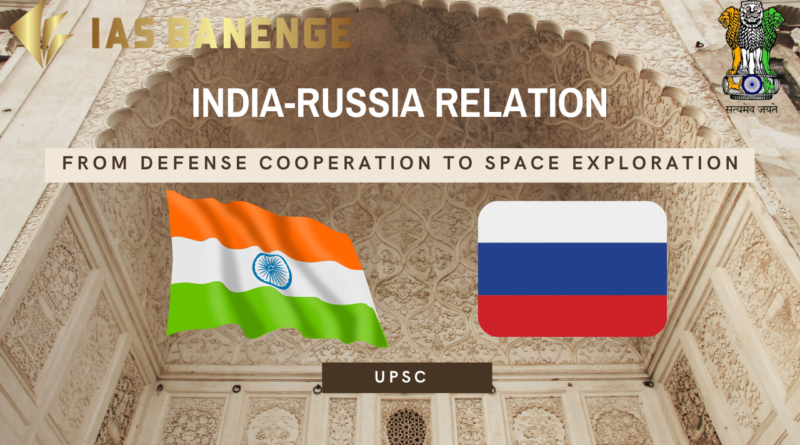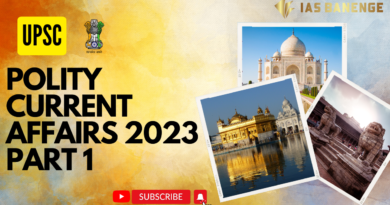India-Russia Relations: A Timeless Bond of Cooperation and Collaboration- IAS Banenge
India and Russia have a long history of bilateral relations that can be traced back to the early years of India’s independence. The relationship between the two countries has been characterized by mutual respect, cooperation, and shared interests in various spheres such as defense, trade, energy, and culture. Let’s delve into the different aspects and key milestones that have shaped the India-Russia relationship over the years.
Historical Background: The foundation of India-Russia relations can be traced back to the Soviet era when the Soviet Union supported India’s independence struggle against British colonial rule. The two nations established diplomatic relations in 1947, shortly after India gained independence. This laid the groundwork for a strong and enduring partnership.
Strategic Partnership: In 2000, India and Russia elevated their relationship to the level of a “strategic partnership.” This designation symbolized the deepening of ties and highlighted the mutual trust, shared values, and common interests between the two nations. The strategic partnership has been a defining aspect of the India-Russia relationship.
Defense Cooperation: Defense cooperation has been a crucial pillar of the India-Russia relationship. Russia has been India’s largest defense supplier, providing advanced military equipment, technology transfers, and joint production of defense systems. The acquisition of major defense platforms such as aircraft, tanks, submarines, and missile systems from Russia has significantly contributed to India’s defense capabilities.
Nuclear Cooperation: India and Russia have collaborated extensively in the field of nuclear energy. In 1988, the two countries signed a landmark agreement on the peaceful uses of nuclear energy. Russia has played a pivotal role in the construction of India’s nuclear power plants, including the Kudankulam Nuclear Power Plant in Tamil Nadu. The two countries also cooperate in areas such as nuclear safety, research, and development.
Economic and Trade Relations: Although defense and strategic cooperation have traditionally dominated the India-Russia relationship, both countries have been working to diversify their economic ties. Bilateral trade has witnessed steady growth, with a focus on sectors such as energy, pharmaceuticals, information technology, agriculture, and diamonds. Efforts have been made to enhance trade and investment through mechanisms such as the India-Russia Inter-Governmental Commission on Trade, Economic, Scientific, Technological, and Cultural Cooperation.
Energy Cooperation: Russia is a significant supplier of energy resources to India. Cooperation in the energy sector includes long-term contracts for the supply of crude oil, petroleum products, and liquefied natural gas (LNG). Indian companies have also invested in Russian oil and gas projects, contributing to energy security and economic cooperation between the two countries.
Space Collaboration: India and Russia have collaborated in space exploration and satellite technology. Russia has been a key partner in India’s space program, providing launch services and technical assistance. The two countries have jointly developed and launched satellites, including the GLONASS Navigation Satellite System.
Cultural Exchanges: India and Russia share a rich cultural heritage and have fostered cultural exchanges over the years. Cultural festivals, exhibitions, and exchanges of artists, scholars, and students have deepened mutual understanding and strengthened people-to-people ties between the two nations.
Diplomatic Coordination: India and Russia have maintained close coordination on various regional and global issues. They have supported each other on matters of mutual concern in international forums such as the United Nations, BRICS (Brazil, Russia, India, China, South Africa), and the Shanghai Cooperation Organization (SCO).
Evolving Dynamics: While the India-Russia relationship remains strong, there have been shifts in recent years due to changing geopolitical realities and India’s diversification of its international partnerships. India has sought to expand its engagement with other countries, including the United States, Japan, and countries in Southeast Asia.However, India and Russia have reaffirmed their commitment to maintaining the strategic partnership and have adapted to the evolving dynamics. Both countries recognize the importance of their historical ties and the value of continued cooperation in areas of mutual interest.
READ MORE – About Gig Economy |Ias Banenge
Several recent developments highlight the ongoing collaboration between India-Russia:
Annual Summits: The leaders of India and Russia hold annual summits to discuss bilateral relations and global issues. These summits provide a platform for high-level strategic dialogue and the signing of agreements in various sectors.
Defense Cooperation: Defense collaboration remains a vital aspect of the relationship. India continues to procure advanced defense systems from Russia, such as the S-400 air defense system. Joint military exercises, personnel training, and exchange programs further enhance defense ties.
Space Exploration: India’s space agency, the Indian Space Research Organisation (ISRO), has partnered with the Russian Federal Space Agency (ROSCOSMOS) on multiple space missions. Collaborations include joint satellite launches, astronaut training, and potential joint missions to the moon and Mars.
Economic Cooperation: India and Russia are exploring avenues to expand economic ties beyond defense and energy. Efforts are underway to boost bilateral trade, attract investments, and enhance cooperation in sectors like pharmaceuticals, information technology, and agriculture.
Connectivity Initiatives: India and Russia have expressed interest in collaborating on connectivity projects, such as the International North-South Transport Corridor (INSTC). The INSTC aims to enhance trade connectivity between India, Russia, and other countries in the region by developing multimodal transportation networks.
Arctic Cooperation: With Russia’s growing focus on the Arctic region, India has shown interest in Arctic research, resource exploration, and environmental cooperation. Both countries have engaged in discussions to explore opportunities for collaboration in the Arctic.
People-to-People Exchanges: Cultural exchanges and educational collaborations continue to strengthen the bond between the peoples of India and Russia. Scholarships, student exchange programs, and cultural festivals promote mutual understanding and friendship.
It is important to note that while India is diversifying its international partnerships, Russia remains a key strategic partner and a trusted friend. The India-Russia relationship is based on shared values, historical ties, and converging interests. Both countries recognize the potential for further cooperation and are committed to deepening their engagement across various sectors.
In conclusion, the India-Russia relationship has evolved and endured over the years, encompassing diverse fields such as defense, energy, trade, space, and culture. Despite changes in the global landscape, both countries have continued to prioritize their strategic partnership. As India seeks to expand its global footprint, Russia remains a significant partner in India’s quest for economic development, technological advancement, and regional stability.





It was an excellent comtent thank you for sharing🙏
It was an excellent comtent thank you for sharing🙏Need more content like this